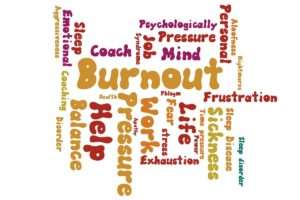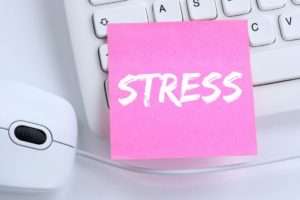Burnout from work is a growing problem that affects people of all ages, professions, and income levels. But there are ways to prevent burnout before it happens and to recover when it does strike.
Burnout from work is a serious issue that can affect your health, relationships and career. In fact, some experts have argued that workers are more prone to burnout due to the increasingly demanding nature of the work environment.
In 2021, approximately 52 % of employees reported experiencing burnout (Threlkeld, 2021).
As such, it’s important to understand the causes of burnout from work, how it affects your life, and what you can do about it.
Notably, one survey showed that more than 67% of participants believed that burnout has increased, particularly for persons who now work virtually.
This may be due to remote employees working more hours due to pressure from managers, customers or even self-imposed compulsion (Threlkeld, 2021).
This blog post will explore:
- What exactly burnout from work is.
- The signs of burnout from work.
- Tips to prevent burnout from work.
- The stages of burnout from work.
- Common causes of work-related burnout.
- Reentering the workplace after a bout of burnout.
- Burnout from work is a growing problem that affects people of all ages, professions, and income levels. But there are ways to prevent burnout before it happens and to recover when it does strike.
- What is work burnout?
- The signs of burnout from work
- The stages of burnout
- Tips To Prevent Burnout At Work
- Common causes of work-related burnout
- Reentering the workplace after a bout of burnout
- Final works on burnout at work
- The importance of developing healthy coping mechanisms
- Tips for changing careers
Let’s get started!
What is work burnout?
Burnout is more than just feeling tired. It is a state of physical and emotional exhaustion caused by prolonged stress. It occurs when you lose all interest in your work, feel like nothing is going right,
believe there’s nothing more that you can do to improve the situation at work, and lack the motivation to experience success or even a good day.
The signs of burnout from work
While the experience of burnout from work is different for everyone, there are some key symptoms that are common.
According to the World Health Organization, burnout should be diagnosed as an “occupational phenomenon” and not a medical condition. Additionally, anxiety, adjustment and mood disorders must be ruled-out prior to diagnosis (WHO, 2019).
If you are experiencing some of these symptoms, then chances are high that you may be suffering from burnout:
- Exhausted all the time even with no justifiable reason.
- Have trouble making decisions.
- Feel cynical or negative toward people around you.
- Experience physical symptoms like headaches or stomach problems with no medical explanation.
- Little motivation to do everyday tasks.
- Chronic fatigue.
- Difficulty concentrating on things that used to be simple for you.
- Increased irritability, anxiety or feelings of depression.
- Lack of interest in things that you once cared about.
- Feelings of being overwhelmed, unfocused or out of control.

"Burnout happens when you avoid being human for too long." - Michael Gungor
The stages of burnout
Burnout happens in stages. If you recognize the signs early on, you can take steps to prevent the process from intensifying.
Remember that burnout is not a sign of weakness. But, it can lead to serious health problems.
Notably, prior to experiencing burnout, you may feel enthusiastic and energetic. You have a desire to achieve things and complete your work on time and with high quality standards.
According to scholars, there are four stages of burnout. These include :
Exhaustion: Stage 1 of burnout from work
In this first stage of burnout from work you have lots of responsibilities and a hectic schedule which causes physical, emotion and mental exhaustion.
Subsequently, you may be overwhelmed by what seems like insurmountable problems.
Shame and doubt: Stage 2 of burnout from work
In this second stage of burnout from work you consider saying no to some projects or even asking for help.
As such, it’s not uncommon to begin to believe that you’re no good at your job or perhaps not cut out for it. You might start thinking that you should quit your job.
Cynicism and callousness: Stage 3 of burnout from work
In the cynicism and callousness stage you start to shut yourself off from others. You have decreased productivity, negative thoughts about yourself and others, feelings of self-doubt and guilt.
In fact, a major symptom at this stage is depersonalization where you detach yourself from people around you. You may even feel like it’s not really your problem anymore.
Failure and helplessness: Stage 4 of burnout of work
Failure and helplessness is the final stage of burnout from work. In this stage you lose all motivation. By this point in burnout, you’re easily irritated and may even have a temper.
Your emotional defenses are worn down and you are overly sensitive and anxious.
Tips To Prevent Burnout At Work
Now that you are aware of what exactly burnout at work is, I’m sure you’re probably wondering what can be done to prevent it form happening.
The key lies in understanding exactly why you get stressed out about our jobs so much in the first place.
There are three main causes of workplace stress:
- Lack of control and support with workload.
- Poor communication, engagement and management.
- High stress with long hours spent at work.
By identifying these factors early on, managers can take steps to reduce them before they become too problematic for their team members – ultimately preventing burnout from occurring altogether!

"Burnout is what happens when you ignore the soul whispering against an unhealthy job or relationship." - Dr Dina Glouberman
Regardless, whenever possible, avoid the tendency to take on too much and try not to over commit yourself. Instead:
1.Delegate some tasks if you are feeling overwhelmed
Delegating to another person will help to take some of the pressure off your shoulders and allow you to focus on other things.
Thus, take a look at how you approach projects. You may, for example, have a penchant for taking on way too many new things in an attempt to prove your value to the company.
Related: Ultimate guide to increase your personal productivity.
2.Use your downtime more effectively
Consider making use of your down time (long commutes, waiting at the doctor’s office, etc.) to get some work done.
This will allow you to tackle everything on your to-do list so that you have more free time.
3.Take a day off every now and then!
This is probably one of the most obvious tips on preventing burnout but something I think we all tend to forget. Taking a break from work every now and again allows you some time to recharge.
Although most people find it’s difficult to take a break, especially if they are not financially stable, sometimes you have to plan for contingencies.
This means prioritizing things that need to get done and including time off for yourself. If you can’t afford an actual vacation, you can consider staying home for a weekend to rest.
4.Ask for help
If you have more to do than can be done in a normal workday, ask someone else to pitch in. In fact, asking for help may seem difficult, but it is a great way to avoid burnout and ensure that you stay motivated and productive at work.
5.Try a few stress management techniques
The more stressed you are, the less control you have over your life. That’s why it’s important to try and decrease your stress levels as much as possible in order to prevent burnout from occurring altogether.
Related: 16 Proven tips for coping with difficult situations
6.Set boundaries with work
Setting work-related boundaries may include turning off your phone during the evening or leaving earlier in the day.
Establishing work boundaries will help you stay in control of your work/life balance, increase workplace satisfaction and hopefully stop you from feeling exhausted all the time.
Do this by finding a happy medium between work and personal commitments. You can achieve this by:
- Setting guidelines for yourself (e.g., set a limit on the number of hours you will work each day)
- Routinely take breaks to stretch, chat, or walk around your office.
- Do something enjoyable in your spare time (hobbies, exercise, socializing with friends, etc).
- Use your lunch breaks to get some fresh air and eat something healthy.
- Identify ways to de-stress (e.g., meditation, yoga).

"Overworking is the black plague of the 21st century." -Richie Norton.
8.Consider your family
Think about the impact that the job is having on those closest to you and assess whether it’s time to scale back a bit. In the long run, prioritizing yourself and family will likely prevent feelings of guilt.
9.Prioritize
This may include making a list of things you need to do, and prioritizing them. Prioritizing is important in order to prevent, or at least reduce, any feelings of being overwhelmed.
Make sure that what’s most important gets done first before moving down the list.
Related: 5 Rules to live a more meaningful life.
10.Take care of yourself
It is important to take good care of yourself to prevent burnout. Consider setting aside time in the morning, afternoons and evenings for activities like exercise, spending time with your family, and other things that help you unwind.
Besides getting enough sleep try to make time for the following activities:
- Exercise regularly with friends or go out for a walk on your own: A brisk walk is a great way to clear the mind. If you can, try to do this regularly!
- Spend time outdoors: A walk in the park or among trees and plant life can refresh your body.
- Take a break: Get up and do something that doesn’t involve working on a computer screen. This could be reading, knitting, doing a puzzle or debating. Having fun with friends and family can give you an extra boost of energy.
Related: 12 Spiritual self-care tips to boost your health/ 7 Physical self-care ideas to practice daily/ Psychological ideas for self-care to transform your life.
11.Be careful about overworking
Make sure you set realistic goals for yourself and try not to take on too much at once or stretch yourself beyond your limits.
It is often tempting to take on more than we realistically should. But, if you’re feeling overwhelmed, take a step back and consider carefully whether you can actually do what you’ve agreed to do.
12.Set boundaries
Setting boundaries with your friends and family will help ensure that the time you spend with them is quality time, rather than rushed.
13.Clarify your values
Consider what really matters to you in life apart from your job. For example, do you value relationships with friends and family? Or is faith important to you?
Identifying your values enables you to set boundaries that will help prevent burnout from work.
14.Recognize the signs
It’s crucial that you are aware of the symptoms of burnout and the toll that it can have on your personal health and wellness.
This will help you be much more deliberate when it comes to implementing these strategies to prevent burnout.
But I’m sure you’re wondering what are the steps needed if you’re already suffering from burnout. Read on to discover helpful strategies for work related burnout.

"The stressful life leads to neglect of spirituality and wellness." -Laila Gifty Akita
Common causes of work-related burnout
Burnout isn’t something that happens overnight. In fact, it takes time and effort to develop over time with repeated stressors in your job or personal life.
It’s important not only to identify what caused your burnout but also how these factors might affect other aspects of your life so you can prevent future incidents from happening again and again without realizing why this is happening.
Burnout is typically caused by an imbalance in your professional and personal life. Risk factors may be.
- Intrinsic: from within, or inherent. For instance, interpersonal conflicts, conflicts with job demands and values.
- Extrinsic: from outside or an external influence. For instance, high work demands, low resources and a chronic nature.
Some of the most common causes include.
Predisposing personalities
Unfortunately, some individuals may be more prone to burnout from work. For instance, some individuals feel compelled to do everything perfectly at work, which can lead to feelings of disappointment when tasks are not completed to the highest standard. This is a recipe for burnout.
Other predisposing personalities for burnout from work include persons with type A personality (ambitious, organized, proactive), caregivers, persons who are emotionally unaware or intentionally suppress their emotions.
According to research, people who work in human services such as health, education and social services; public administration and safety – are more likely to experience burnout than those who work in business or finance.
Inadequate coping skills
Ineffective coping mechanisms to address conflict, stress, and demands at work is a risk factor for burning out.
If you have a history of mental illness, addiction, or family members who have struggled with these issues, it is especially important to work on your self-care skills early on.
It is also helpful to learn effective coping mechanisms, such as mindfulness and meditation.
Related: 16 Proven tips for coping with difficult situations
Poor performance review and recognition
If you have been in your job for a long time or your most recent performance review was less than satisfactory, it may be difficult to feel motivated at work.
This is especially true if you believe that the lack of recognition and poor feedback are unmerited.
In fact, if your managers do not recognize their employees’ value, they might begin to feel unmotivated and unappreciated.
Work pressure
Individuals with high workloads, tight deadlines and unrealistic expectations tend to be more stressed and perform worse than their counterparts. Subsequently, they are at a higher risk of becoming burnt out.
Do you really dislike your current job? Is the workload overwhelming and unmanageable? These are signs that it might be time for a career change.
If you are unhappy in your job, try to stay positive and remember that there are other opportunities out there for you.
However, you should know that there are also lots of highs and lows that come with making a career shift.
Related: Career shift: How to master the transition.

"I am afraid that there is no cure for burnout, after all you can't UNTOAST TOAST."- Ella Dowson
Relationship problems
Stress caused by relationships can tax your coping resources. If you have a history of significant relationship issues, consider working with a therapist to improve communication and problem-solving skills before turning to burnout.
Frequently changing roles
If you feel like your job responsibilities and tasks are always changing, it’s time to take a step back and examine how these changes may affect you.
Unclear job responsibilities and conflicting priorities within an organization can be frustrating and overwhelming due to the lack of consisting.
It is important for employees to understand their responsibilities and goals for the future. In fact, when these expectations are vague or unrealistic, it can be difficult to feel satisfied with your job.
Work-life imbalance
The demands of your job should not be taking over your personal life. Be kind to yourself and do what’s best for you when making decisions about work.
Poor interpersonal relationships with co-workers or supervisors
You spend a lot of time at work, so it is important to get along with your co-workers and bosses.
If there are issues or conflicts that have not been resolved, seek out advice from human resources or reach out to the employee assistance program if you feel comfortable doing so.
Job insecurity
Employees who do not feel safe in their role may feel neglected and unappreciated. Unfortunately, this lack of support can amplify feelings of burnout.
Poor physical health
A healthy body leads to a healthy mind. If you are not getting enough rest, exercise or time for your hobbies, it can be difficult to maintain mental and emotional equilibrium.
Family responsibilities
Some working parents may increasingly struggle to balance their professional and personal lives. They may even feel guilty about not spending enough time with their children.
Inadequate skills
Some individuals who are underqualified for their job may experience high levels of stress when attempting to complete tasks that exceed their skill level.

"BURNOUT is when long term exhaustion meets diminished interest." - Unknown
Low salary
Those who receive an unsatisfactory wages and benefits may have trouble making ends meet. It can be difficult to stay motivated without a sufficient financial incentive.
Plus, this may lead to employees working longer hours and several jobs.
Shiftwork
Working unsociable hours is difficult for many employees. Furthermore, it is difficult to adjust circadian rhythms if you are constantly changing shifts.
Long commute times
If your job requires that you commute for a number of hours each day, then this will likely be another source of stress.
Changing work environment
Changing roles within an organization can be an exciting time, but it is important to stay focused. If you are making a career move, make sure you have the support of your current employer during this transitionary period.
Workplace bullying
Employees who experience workplace bullying are more likely to become stressed, lose sleep and feel depressed than their counterparts.
Poor organizational culture
The work environment can have a significant impact on your job satisfaction and mental wellbeing.
If they are not clearly communicated to employees, it can be difficult to understand what is expected.
Also, if there is a lack of trust and respect, poor leadership, limited employee participation, openness and validation in the company culture, it can put an enormous amount of pressure on employees.
Lack of resources to complete job responsibilities
If you are not being given the tools you need to complete your job, this can also lead to significant frustration.

"Burnout is a byproduct of a dysfunctional work environment." -joy Energy Time Club
Reentering the workplace after a bout of burnout
Recovery from an episode of burnout is critical for maintaining your personal well-being. However, you should know that your symptoms aren’t permanent and you will be ready to return to the workplace eventually.
Here are some tips to help you prepare yourself for the job hunt by addressing obstacles that stand in your way.
- Get up to date with references and recommendations from previous employers or colleagues.
- Be prepared to explain any gaps in your employment history during a job interview.
- Write a resume that highlights your best skills and attributes, while downplaying any weaknesses.
- Network with professional associates to gain insight into the job market.
- Research companies that interest you prior to an interview, so you know what they do and how you’ll fit in.
- Connect with employment counsellors and job search professionals to help you gain the confidence needed to re-enter the workforce. You can also get career advice from people who have been there before, so don’t be afraid to ask questions.
- Be patient with yourself during the recovery process and know that you’re not alone. Many other people have gone through what you are going through right now and come out stronger in the end.
Final works on burnout at work
If you’re feeling burn out from work, it can be hard to find motivation and energy for your job. You may feel like you’re stuck in a rut or that nothing will ever change.
This is normal—and there’s hope! Burnout doesn’t have to limit your professional dreams. But, you must take the right steps now, before things spiral out of control.
Have you or anyone you know experienced burnout from work? Let me know in the comments below.
Related Topics
The importance of developing healthy coping mechanisms
In today’s world, it’s hard to avoid stress. Unfortunately, many people don’t realize the importance of developing healthy coping mechanisms which are extremely beneficial to your mental well-being.
There are many ways that coping mechanisms can help you manage the symptoms of these conditions and improve your quality of life. Read more
Tips for changing careers
If you’re looking for a new career, it can be overwhelming to figure out where to start. In fact, it takes time, patience and hard work to find the right career path. But, it’s worth it in the end!
There are many benefits of changing your career including more money, better hours and even better company culture. You can do this! We have some tips that will help you get started on your journey to finding a new career today. Read more.
References
Gorkin, M (unknown) The Four Stages of Burnout.
Threlkeld, K (2021) Employee Burnout Report: COVID-19’s Impact and 3 Strategies to Curb It.
World Health Organization (2019) Burn-out an ‘occupational phenomenon”: International Classification of Diseases
Rushana Greenidge-Horace










Leave a Reply